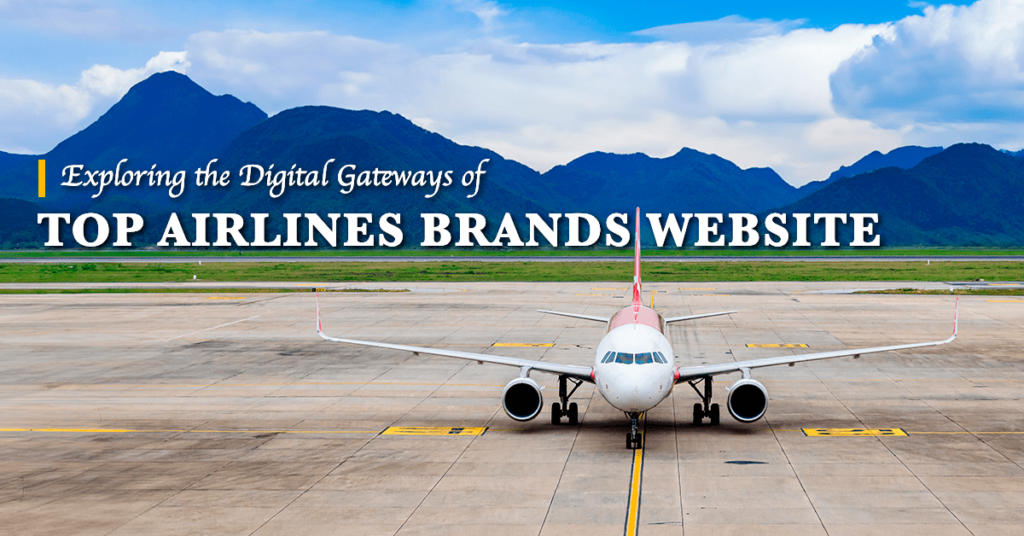
Welcome back, fellow readers of WDD Blog and travel enthusiasts! We’re continuing our exploration of top airline brands website, but this time, let’s focus on the subtleties that make each site unique. From brand identity to the nuances of colour and typography, we’re unravelling the elements that make these websites not just functional, but a visual treat! These airlines aim to enhance user engagement and provide a unique digital experience, reflecting their core values and mission to connect people while showcasing their unique cultural and environmental heritage.
Introduction to Airline Website Design

Airline website design is a crucial aspect of the aviation industry, serving as a digital gateway for airlines to showcase their services, destinations, and brand identity. A well-designed airline website can significantly enhance customer satisfaction, increase user engagement, and drive bookings. In today’s digital age, having a user-friendly and visually appealing website is essential for airlines to stay competitive.
Take Emirates airline, for example. Their website is a masterclass in effective airline website design, providing detailed flight information, easy navigation, and a range of booking options. This not only makes the booking process seamless but also ensures that users have a positive experience from the moment they land on the site. By focusing on these elements, airlines can create a digital presence that not only attracts but also retains customers, setting them apart in the competitive aviation industry.
Setting the Stage for Digital Excellence in the Airline Industry
In the highly competitive airline industry, having a strong online presence is vital for attracting and retaining customers. A well-designed airline website should prioritize customer experience, offering easy navigation, clear information, and a seamless booking process. By incorporating elements such as a minimalist aesthetic, elegant typography, and vibrant accents, airlines can create a website that reflects their brand and values.
Moreover, optimizing the website for mobile devices is crucial, as an increasing number of travelers are booking flights on their smartphones. This ensures that the website is accessible and user-friendly across all platforms, enhancing the overall customer experience. By focusing on these design principles, airlines can create a digital presence that not only meets but exceeds customer expectations, driving engagement and loyalty.
1. Qatar Airways
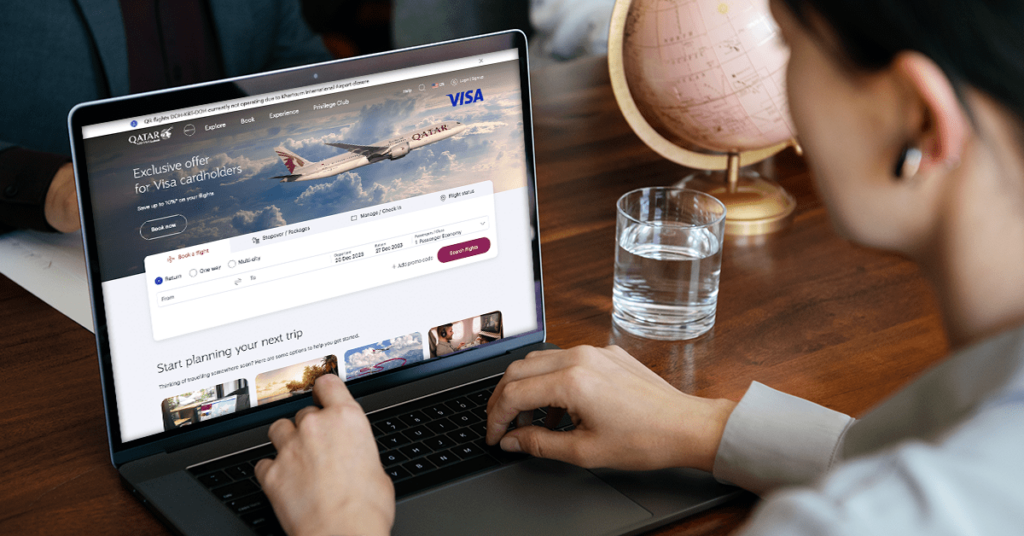
Soaring Beyond Expectations on the Digital Front
Qatar Airways exemplifies excellence, innovation, and cultural richness, with core values focused on exceptional service and diversity. Their vision is to be the world’s preferred airline, offering unparalleled service both in the air and on the ground. Their strategy includes expanding their global network, investing in modern aircraft, and prioritizing customer-centricity. This approach is reflected in their luxurious travel experiences and extensive network connecting over 160 destinations globally.
The website mirrors their prestigious brand identity, using a rich color palette and sophisticated typography to convey luxury and quality. It focuses on showcasing high-end services and exotic destinations, aligning with the brand’s commitment to excellence. Navigating the Qatar Airways website reveals a digital reflection of their dedication to excellence and innovation.
Every element, from color choices to content, is thoughtfully designed to resonate with their core values and brand identity. The site is more than just a booking portal; it encapsulates the essence of one of the world’s leading airlines, offering a seamless and luxurious digital experience that mirrors their in-flight service. Next time you visit, take a moment to appreciate the craftsmanship that embodies Qatar Airways’ commitment to quality and customer satisfaction.
2. Singapore Airlines
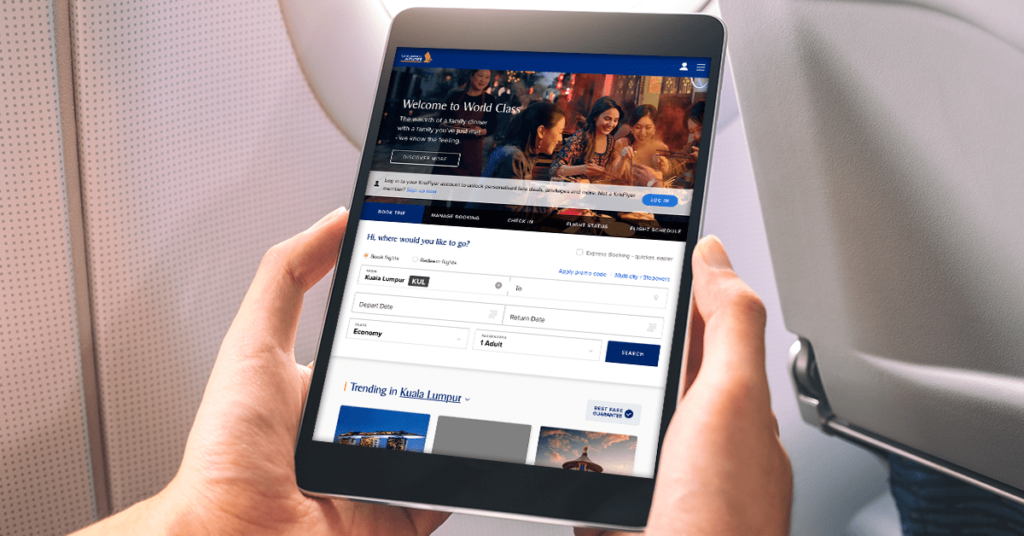
A Closer Look at the Digital Reflection of Excellence
Singapore Airlines’ website embodies the airline’s core values of customer focus, excellence, and integrity, reflecting their mission to provide top-tier service. With a vision to be the world’s best airline, the site prioritizes user experience and service quality, showcasing their premium carrier status through state-of-the-art fleet details and award-winning in-flight services.
The site highlights various cabin classes, from luxurious first-class suites to comfortable economy seats, emphasizing renowned in-flight meals and entertainment options alongside the iconic Singapore Girl. The website’s design is user-centric, featuring intuitive navigation and a streamlined booking process that mirrors the airline’s customer-first approach.
A calming color scheme of blues and vibrant accents creates a sense of trust and excitement, while elegant typography enhances readability and reflects the brand’s attention to detail. More than a booking portal, Singapore Airlines’ website captures the essence of their prestigious brand, showcasing their dedication to quality, innovation, and unparalleled customer service.
3. ANA Airline (All Nippon Airways)
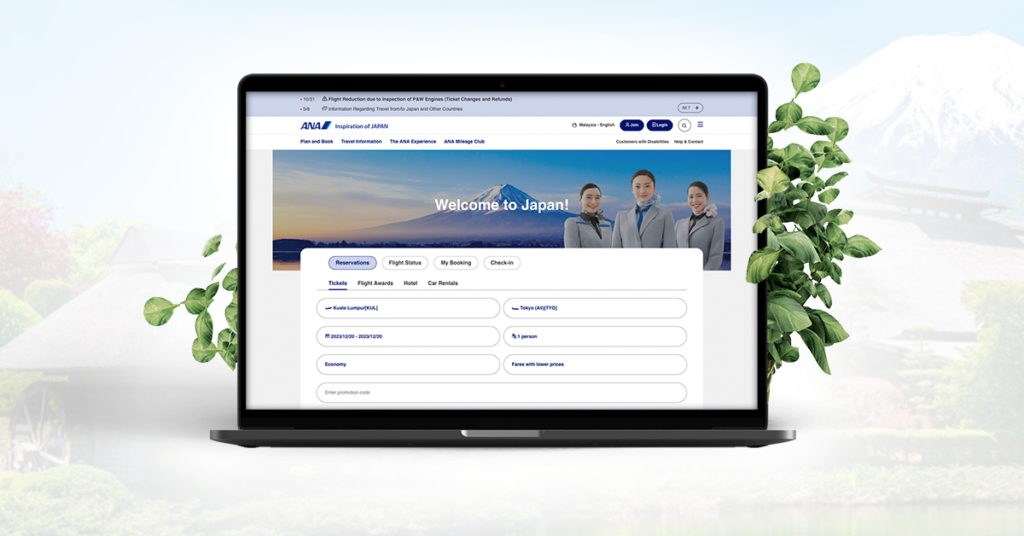
A Digital Reflection of Tradition and Innovation
ANA Airline’s website transcends mere aesthetics, embodying the airline’s ethos rooted in Japanese heritage. With a focus on reliability, safety, and customer satisfaction, ANA aims to connect people and cultures globally. Their digital platform reflects this mission, offering detailed flight information and showcasing diverse destinations.
The site is a key tool in ANA’s strategy for sustainable growth and innovation, highlighting their eco-friendly fleet and extensive flight options to attract a wide range of travelers. Services like international and domestic flights, cargo, and frequent flyer programs are neatly categorized for easy navigation. The website’s design, featuring a modern color palette of blues and greens, mirrors ANA’s commitment to environmental sustainability and innovation.
Its layout prioritizes destinations and fleet innovation, complemented by clean typography that aligns with the airline’s contemporary image. As users explore the site, they encounter elements that echo ANA’s core values, from safety information to customer testimonials. Ultimately, ANA’s website is a gateway to understanding and connecting with the brand’s deeper values and offerings, portraying their dedication to bridging global connections with Japanese hospitality and innovation.
4. Emirates Airline
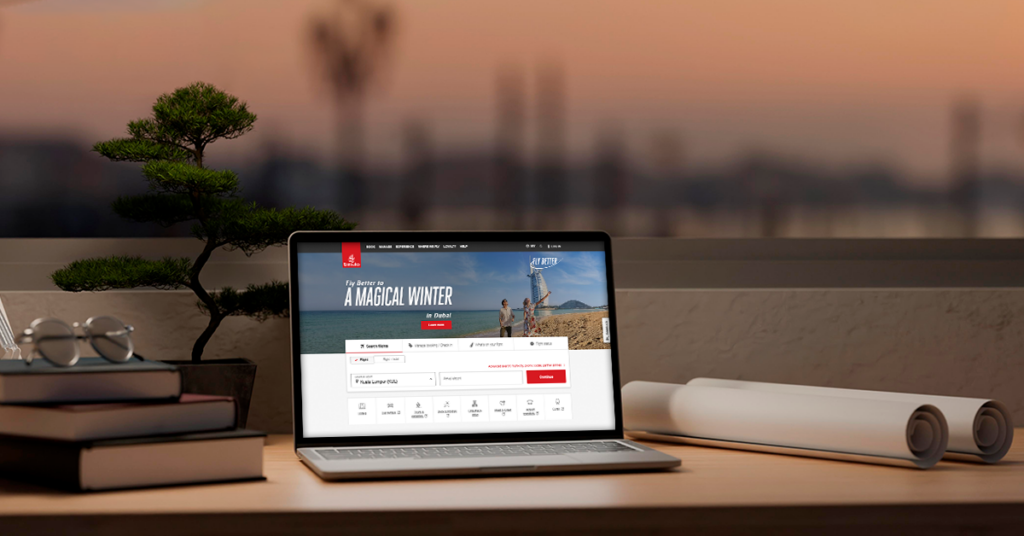
A Digital Reflection of Grandeur and Innovation
Emirates’ website is a digital embodiment of luxury and innovation, reflecting the airline’s bold identity. With a rich color palette of reds and golds, the site showcases lavish in-flight experiences and exotic destinations. Bold and elegant typography complements the brand’s commitment to quality and exclusivity, aligning with their vision of connecting the world and enriching lives through exceptional travel services.
Emirates emphasizes continual growth and market expansion, maintaining a competitive edge with a modern fleet and exceptional service. The Dubai hub serves as a strategic global transit point, enhancing their extensive route network. Partnerships and alliances further expand their global reach, ensuring a comprehensive range of services, including:
Luxurious In-Flight Experience: Spacious seating, gourmet dining, and award-winning entertainment.
Extensive Route Network: Global connectivity with a vast array of international destinations.
Cargo Services: Efficient cargo transportation solutions.
Loyalty Programs: Rewarding customer loyalty with various benefits and privileges.
The Emirates website is more than a booking portal; it is a digital gateway to the airline’s ethos and aspirations. From color schemes to content, every element reflects their mission to provide unparalleled service, making each interaction a seamless experience that embodies the brand’s soaring ambitions.
5. Air New Zealand
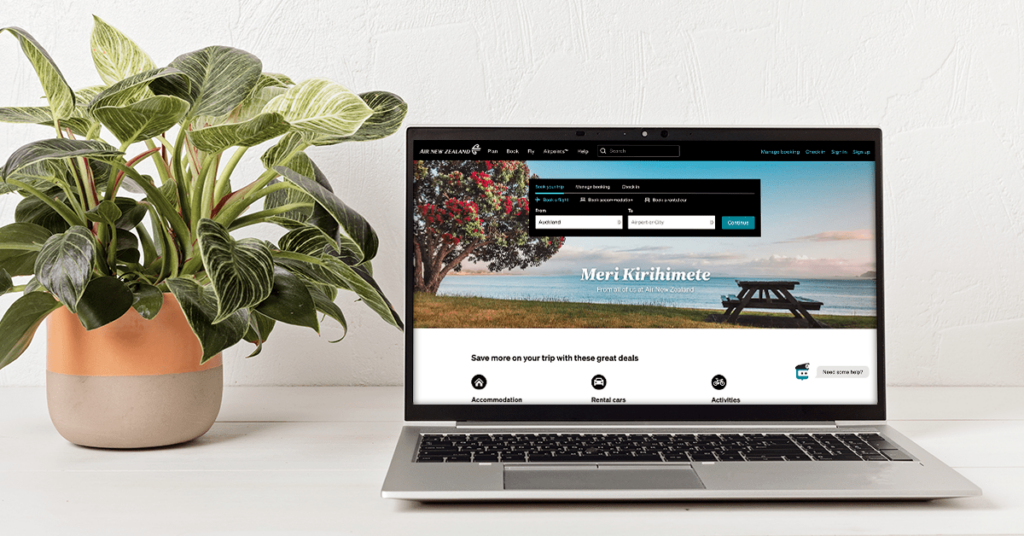
A Digital Experience as Unique as the Land of the Long White Cloud
Air New Zealand’s website is a digital reflection of its adventurous and innovative spirit, embodying New Zealand’s welcoming culture and breathtaking landscapes. The airline focuses on sustainability, customer-centricity, and safety, celebrating rich Māori heritage. Their mission is to connect people and cultures globally, providing a unique Kiwi experience. The website showcases both international and domestic offerings, emphasizing their commitment to sustainability and operational efficiency.
Expect a color palette inspired by New Zealand’s natural beauty, with lush greens, ocean blues, and earthy tones. The user-friendly design focuses on destinations, particularly in the Pacific, with clear and modern typography that enhances readability. The website tells the story of Air New Zealand’s values and offerings, serving as a digital gateway to the heart of New Zealand.
6. Qantas Airline
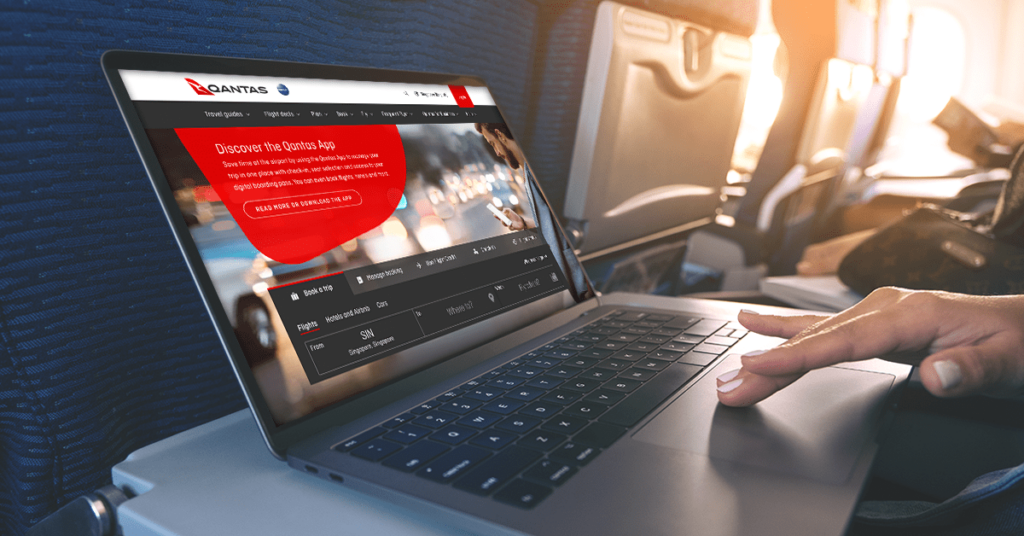
A Digital Reflection of a Rich Legacy and Forward-Thinking Strategy
Qantas Airline’s digital presence reflects its deep-rooted values and strategic approach to the aviation industry. As Australia’s flagship carrier, Qantas is synonymous with safety, reliability, and outstanding customer service. The website embodies these principles, offering a seamless user experience with a classic red and white color scheme that signifies confidence and vitality. The site highlights Qantas’s extensive network of destinations, showcasing a range of flight classes and services that cater to both passenger comfort and cargo efficiency.
The website’s layout is designed to emphasize Qantas’s multifaceted business strategy, which includes strengthening domestic and international networks, modernizing their fleet, and expanding their loyalty program. This strategic focus is evident in the seamless navigation, detailed flight information, and insights into their frequent flyer benefits. Every element of the website reflects Qantas’s commitment to customer care, professionalism, and excellence in the aviation industry.
Ultimately, the Qantas website is more than just a booking portal; it is a digital embodiment of the airline’s rich history and aspirations for the future. From its user-friendly interface to the strategic showcasing of destinations and services, the site offers a glimpse into the heart of this iconic airline, making each interaction a testament to Qantas’s passion for aviation excellence.
7. Japan Airline (JAL)
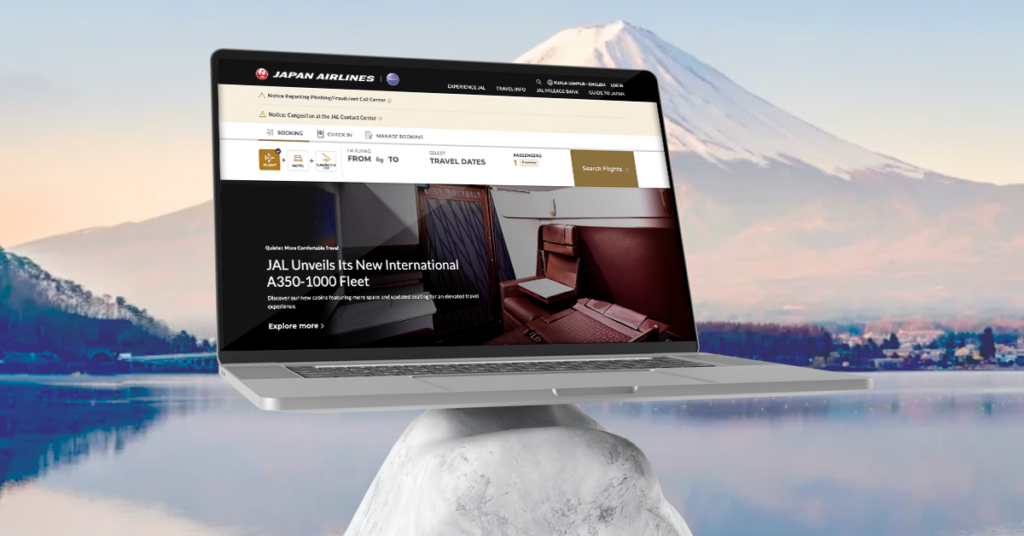
A Symphony of Tradition and Innovation in the Sky and Online
Japan Airlines’ digital presence is a seamless blend of traditional Japanese values and forward-thinking innovation. Emphasizing “Omotenashi,” or heartfelt hospitality, JAL’s mission focuses on delivering unparalleled service, safety, and comfort. Their strategy includes sustainable growth, customer-centric services, and technological advancements, aiming to expand their global network with next-generation aircraft.
The website is a digital manifestation of JAL’s values, with a red and white color scheme symbolizing passion and purity. It emphasizes seamless user experience, highlighting destinations, offering clear pricing information, and showcasing a blend of modern typography with Japanese aesthetics. Navigation is intuitive, making it easy to explore different flight classes and routes.
JAL’s online platform reflects its commitment to connecting cultures and enhancing passenger experience. The site is more than a booking portal; it’s a gateway to the airline’s dedication to excellence and innovation, providing a glimpse into their multifaceted services, from passenger travel to cargo and engineering.
8. Virgin America (now part of Alaska Air)

Into the Digital Heart of Virgin America
Virgin America, now integrated with Alaska Air, continues to showcase its vibrant and innovative spirit through its digital presence. Known for its youthful energy, Virgin America stood out in the aviation industry with a focus on delivering exceptional customer service infused with fun and innovation. This ethos likely persists in the website’s playful color scheme and user-friendly interface, designed to make booking flights enjoyable and hassle-free.
The website reflects Virgin America’s vision of revolutionizing air travel by offering high-quality services at competitive prices. By highlighting attractive destinations, clear pricing, and a range of flight options, the site emphasizes the airline’s commitment to an exceptional customer experience. The strategic focus on differentiation through superior service and unique in-flight experiences is evident in the attention to detail and engaging content.
As part of Alaska Air’s digital ecosystem, the website balances traditional and modern styles, merging Virgin America’s playful design with Alaska Air’s established approach. This blend creates a unique user experience that honors Virgin America’s legacy while embracing the future. The vibrant typography and lively gradients continue to enhance the booking experience, making the site a testament to the airline’s innovative spirit and customer-centric values.
Key Principles of Website Design

When it comes to designing an airline website, several key principles are essential for success. Firstly, the website should be user-friendly, with easy navigation and clear information that guides users through the booking process. Secondly, the website should be visually appealing, featuring a modern and elegant design that captures the brand’s essence. Thirdly, the website should be optimized for conversion, with a clear call-to-action and a seamless booking process that encourages users to complete their transactions.
By adhering to these principles, airlines can create a website that not only attracts visitors but also converts them into loyal customers. A well-designed website is more than just a digital platform; it is a reflection of the airline’s commitment to providing an exceptional customer experience.
Foundational Elements for Crafting Exceptional Airline Websites
Creating an exceptional airline website involves incorporating several foundational elements. Showcasing destinations, providing detailed flight information, and offering a range of booking options are crucial. Additionally, airlines should prioritize customer loyalty by offering rewards and incentives for frequent flyers.
Ensuring that the website is accessible on all devices, including mobile devices, is also essential. This caters to the growing number of travelers who book flights on their smartphones, ensuring a seamless experience across all platforms. By integrating these elements, airlines can create a website that meets the needs of their customers and sets them apart from their competitors.
Best Practices for User Experience

To ensure a seamless user experience, airlines should prioritize intuitive navigation, clear information, and a seamless booking process. The website should be designed with the customer in mind, providing easy access to essential services such as booking flights, checking-in, and accessing flight information.
Additionally, airlines should ensure that their website is optimized for search engines to improve visibility and drive organic traffic. By following these best practices, airlines can create a website that provides an exceptional user experience, drives bookings, and enhances customer satisfaction. This not only helps in attracting new customers but also in retaining existing ones, fostering long-term loyalty and engagement.
Creating Digital Masterpieces

The Art of Top Airline Brands Website
Each airline we’ve examined has seamlessly infused their brand essence into their websites, transforming them from mere digital platforms into engaging storytelling mediums. These sites are a perfect balance of functionality and brand narrative. From the intentional selection of color palettes that evoke specific emotions, to focal elements like enticing destinations and clear pricing structures, down to the meticulously chosen typography – every detail is a deliberate brush stroke in their digital masterpiece.
These websites transcend their basic function of facilitating travel arrangements; they embody the core identity of each airline, crafting a digital experience that elevates their brand and resonates with travelers globally. They are designed to connect, narrate a story, and invite users into a world beyond their own, offering a glimpse into the planning your perfect adventure, providing insight into the unique essence of each airline.
Inspired to create a website that embodies a strong brand identity and offers an exceptional user experience? The team at WDD Malaysia, renowned for crafting digital experiences, can help you transform your website into a captivating digital gateway for your audience. With expertise in design and a deep understanding of user engagement, they can elevate your digital presence to new heights. So, next time you book a flight, take a moment to appreciate the artistry and intention behind these airline websites, which are meticulously designed to transport you from the ordinary to the extraordinary.





